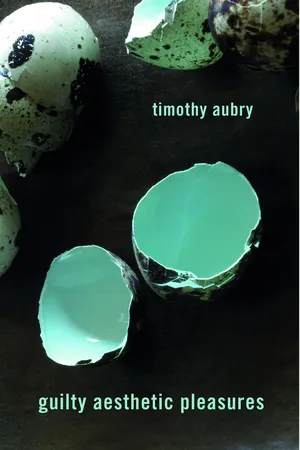
- English
- ePUB (mobile friendly)
- Available on iOS & Android
Guilty Aesthetic Pleasures
About this book
In the wake of radical social movements in the 1960s and 1970s, literary studies' embrace of politics entailed a widespread rejection of aesthetic considerations. For scholars invested in literature's role in supporting or challenging dominant ideologies, appreciating literature's formal beauty seemed frivolous and irresponsible, even complicit with the iniquities of the social order. This suspicion of aesthetics became the default posture within literary scholarship, a means of establishing the rigor of one's thought and the purity of one's political commitments. Yet as Timothy Aubry explains, aesthetic pleasure never fully disappeared from the academy. It simply went underground.
From New Criticism to the digital humanities, Aubry recasts aesthetics as the complicated, morally ambiguous, embattled yet resilient protagonist in late twentieth-century and early twenty-first–century literary studies. He argues that academic critics never stopped asserting preferences for certain texts, rhetorical strategies, or intellectual responses. Rather than serving as the enemy of formalism and aesthetics, political criticism enabled scholars to promote heightened experiences of perceptual acuity and complexity while adjudicating which formal strategies are best designed to bolster these experiences. Political criticism, in other words, did not eradicate but served covertly to nurture reading practices aimed at achieving aesthetic satisfaction.
Guilty Aesthetic Pleasures shows that literary studies' break with midcentury formalism was not as clean as it once appeared. Today, when so many scholars are advocating renewed attention to textual surfaces and aesthetic experiences, Aubry's work illuminates the surprisingly vast common ground between the formalists and the schools of criticism that succeeded them.
Tools to learn more effectively

Saving Books

Keyword Search

Annotating Text

Listen to it instead
Information
Table of contents
- Cover
- Title Page
- Copyright
- Contents
- Introduction
- Chapter One: The Intellectual Critics and the Pleasures of Complexity
- Chapter Two: Appetite for Deconstruction
- Chapter Three: New Historicism and the Aesthetics of the Archive
- Chapter Four: Lolita and the Stakes of Form
- Chapter Five: Why Is Beloved So Universally Beloved?
- Conclusion: Reading the Surface in the Distance
- Notes
- Works Cited
- Acknowledgments
- Index
Frequently asked questions
- Essential is ideal for learners and professionals who enjoy exploring a wide range of subjects. Access the Essential Library with 800,000+ trusted titles and best-sellers across business, personal growth, and the humanities. Includes unlimited reading time and Standard Read Aloud voice.
- Complete: Perfect for advanced learners and researchers needing full, unrestricted access. Unlock 1.4M+ books across hundreds of subjects, including academic and specialized titles. The Complete Plan also includes advanced features like Premium Read Aloud and Research Assistant.
Please note we cannot support devices running on iOS 13 and Android 7 or earlier. Learn more about using the app